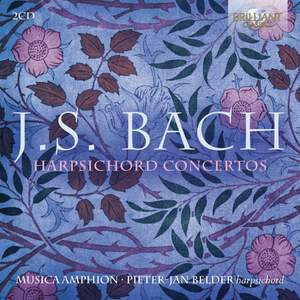Bach at his most extrovert and exhilarating: new, period-instrument accounts of the earliest masterpieces in the lineage of keyboard concertos.
Piano concertos from Beethoven to Brahms to Busoni and beyond are all indebted to the example of Bach in his Fifth Brandenburg Concerto, and its liberation of the harpsichord from continuo support to virtuoso soloist, in both the spectacular first-movement cadenza and the one-against-many dramatic narrative which marks a revolutionary break with the concerto-grosso model of collegiate co-operation.
Bach wrote the six Brandenburgs in his early 30s, while the majority of the works here were either written or compiled once he had moved to Leipzig in 1723. Taking charge of the music at a popular café, he adapted cantata movements and earlier concertos for other instruments, producing seven intricately worked pieces which traverse an expressive range from the high drama of the D minor, BWV1052, to the equable dialogue of the D major, BWV1054 (a reworking of the E major Violin Concerto), to the tightly wound pathos of the F minor, BWV1056.
As both a harpsichordist and music director, Pieter-Jan Belder has been recording Bach’s music for more than two decades with Brilliant Classics and the period-instrument Musica Amphion ensemble which he founded in the tradition of distinguished Dutch early-music groups such as Frans Brüggen’s Orchestra of the 18th Century. He and his colleagues play together with a tightly knit sympathy borne of long familiarity and a comprehensive grasp of Bach’s output across every field of his music.
Filling out the album to well over two-and-a-half hours of music is the A minor Concerto, BWV1044, scored for the same combination of flute, violin and keyboard soloists as the Fifth Brandenburg, and in which the keyboard also takes the starring role, though with certain features which suggest it was either put together late in Bach’s life or possibly by one of his pupils or sons.
Critical praise for Pieter-Jan Belder’s Bach on Brilliant Classics:
‘This new recording is quickly becoming one of my favourite interpretations of the Goldberg Variations... He draws attention not to himself but to the music.’ – American Record Guide (Goldberg Variations, 95471)
‘You can’t really go wrong with this set... a fantastic Book II.’ – Fanfare (The Well-Tempered Clavier, 93892)
‘Belder’s playing is involved and warm.’ – MusicWeb International (Goldberg Variations etc, 93384)
‘His playing is splendid overall, and the musicality of it all means I can listen to it happily without ever feeling he is trying to prove points all the time.’ – Early Music Review (English Suites, 96080)
‘Musica Amphion's performances are nicely refined, historically informed, and technically proficient... the integrity in the playing and attention to details in the score make this disc worth checking out.’ – Allmusic.com (Brandenburg Concertos, 93125)



